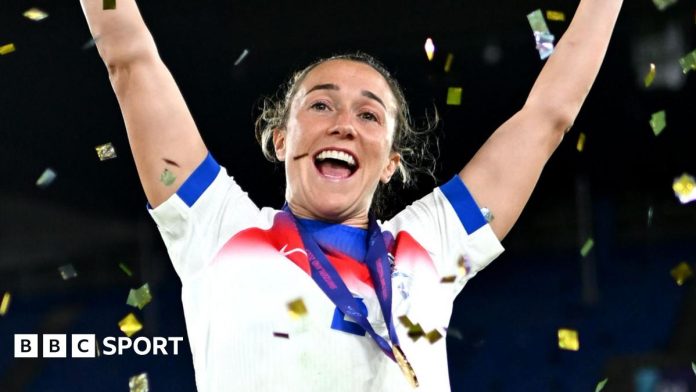Kelly Somers: What does football mean to you?
Lucy Bronze: I guess it has changed throughout the years. When I was younger, it was everything to me. I maybe put a bit too much on it. I have never seen it as a job, I’ll be honest, but what it means to me now has changed. There is football as in the football that I do, and there is the football that I am a part of, which is the big picture. That means a lot to me now.
KS: Your career has gone in parallel with the growth of women’s football. At first you just played football but now it seems like it is a bit of a movement?
LB: I always say I am so fortunate that my career has been on the same trajectory as women’s football in England. 2015 was when I had my moment. It was also the moment for England football and the WSL was kicking off. Each tournament the stage is getting bigger, and the football is getting bigger in line with my career. I have always felt quite lucky to be on the same journey as women’s football.
KS: What is your first memory of playing the game?
LB: I played with my big brother – that’s why I started. When I was younger, people would be like: ‘Is his sister coming?’ And he would be like: ‘Yeah she is, and she’s going to be on my team because she is good.’ He never had a problem with it. He would never let me win anything – if I won it was because I earned it. But I never had that barrier of ‘girls can’t play’ or ‘it’s not girls’ football’ because my family and my brother were some of the best examples of it.
KS: Who had a big impact on your career football-wise?
LB: The very first one was Ray Smith, who was my Alnwick Town coach. When I was in the boys’ team, he was a painter and decorator, then helped with the team on the weekends. Just your local volunteer in grassroots football. And at 12, the FA were like, ‘Lucy can’t play in the boys’ team any more. It’s part of the rules’. My mum was like, ‘Well, she’s got nowhere else to go. We can’t take her anywhere. We can’t afford to take her anywhere’. So Ray went up to my mum, and was like, ‘Please find Lucy a team – she’ll play for England one day.’ At 12 years old.
KS: What has been a turning point in your career? I’m almost wondering if maybe that conversation is it?
LB: A huge turning point for me was going to America. When my mum Googled women’s football, the USA came up. College, Mia Hamm, World Cup, Olympic champions – everything to do with women’s football was USA. So she was like, ‘OK, let’s go’. So she said to all the family: ‘Let’s go to the States next summer. We’ll save up, and if this is your dream, we’re going to take you, and we’re going to see if it’s a possibility.’ This is in the time of Bend it like Beckham . So it was a hot topic at the time, going to America. I went to the soccer camp and the coach there saw me play, and he said: ‘When she’s old enough, she should come back and she’s got a scholarship.’ So I went back because England rejected me. Going to America and going to college, I only stayed for a year, but that was the biggest turning point.
KS: Talk to me about England rejecting you?
LB: I was in the youth age groups, but I was never the star player, or the one that was picked out. They used to give out scholarships and funding to help players, and I never got picked for anything. They had a programme for Loughborough where you could train full-time and study. At my age group, either you went there or you went to Arsenal’s academy and I was the only one who wasn’t in either of them. I applied for Loughborough, and they were like, ‘She’s just not good enough’. My mum rang them back to ask what it is that she needs to improve on, and just never got the call back. So then my mum was like, ‘Right, America, let’s go. Let’s do it’.

